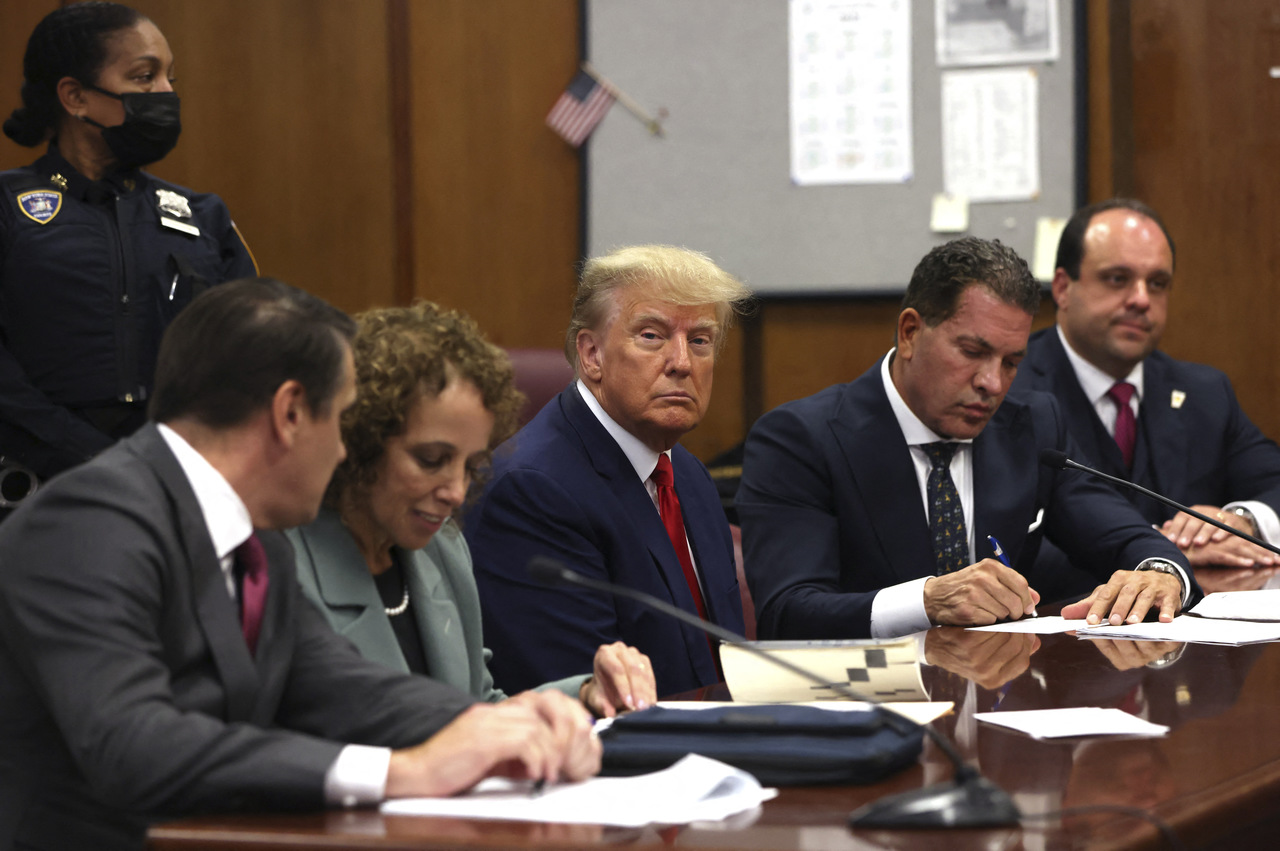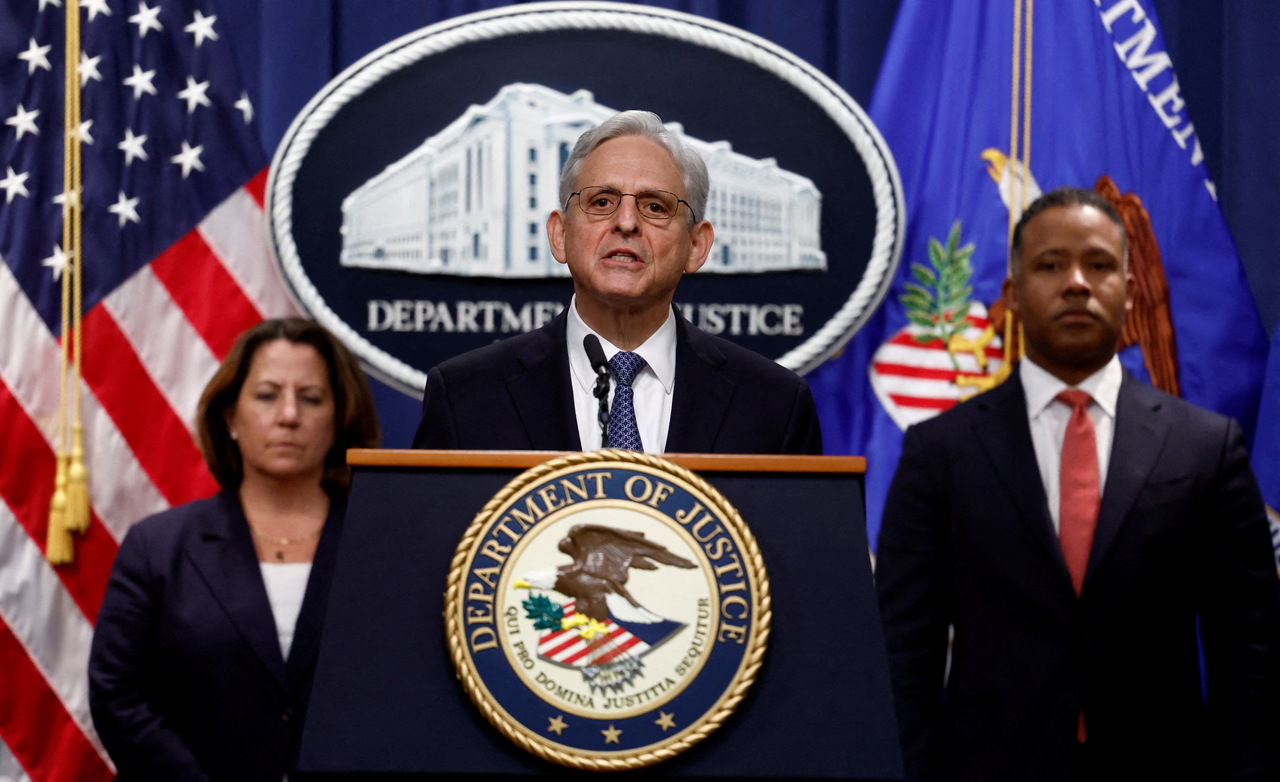Trump Indicted
A Manhattan grand jury has indicted former U.S. President Donald Trump on 34 criminal charges brought by the New York District Attorney of falsifying business records. This is the first time in U.S. history that a former president has been indicted. While this case is purely criminal, it will be heavily politicised by Republicans and Trump himself. He has the best chance of winning the Republican Party nomination in the primaries, which start in February 2024.
 ANDREW KELLY / Reuters / Forum
ANDREW KELLY / Reuters / Forum
What are the allegations against Trump?
Among the charges are forgery of documents, which allegedly took place after Trump had already begun his presidency (February-December 2017). Michael Cohen, one of Trump’s lawyers at the time, allegedly received extra pay during this period for providing mock legal services, paid for with company money, as compensation for money Cohen gave to pornographic actress Stephanie Clifford in 2016 for keeping quiet about her extramarital affair with Trump (Cohen was later convicted in this case, including for influencing the electoral process and violating campaign finance rules). The DA argues that Trump’s falsification of documents was part of a conspiracy to cover up crimes with the intention of not disclosing matters compromising Trump during the election period, which may be a violation of federal campaign finance laws but outside of the DA’s jurisdiction. To this end, Trump and Cohen’s collaboration with the owner of the tabloid The National Enquirer, which paid model Karen McDougal (for her story, but to silence her about her relationship with Trump), in coordination with Cohen and Trump, was linked to the case.
What is the possible punishment for the former president?
Formally, violation of the law on falsifying business records is punishable by up to four years in prison and a fine, applied to each of the allegations separately. However, there is a very low probability that Trump will be sentenced to prison if found guilty. Prison time is rarely imposed for first-time convictions, and in Trump’s favour also is his status as a former president and the need to provide him with round-the-clock protection by the Secret Service. The first court hearing is scheduled for 4 December 2023. The case may encounter numerous difficulties resulting in delays, such as the selection of jury members to decide guilt. Per practice, each of the potential jurors will be assessed in the presence of representatives of both sides in terms of impartiality (either for or against the accused), which may be difficult to find in this case involving a former president and an active candidate for the office. It is therefore uncertain whether a verdict will be reached before the presidential election in November 2024.
What is Trump’s defence?
The exact legal strategy of Trump’s lawyers remains unknown; however, it is expected that they will question Cohen’s credibility as the main witness in the case and over his cooperation with the DA’s office. In addition, they may seek to claim a breach of jurisdiction by the New York District Attorney, citing it as pertinent to federal electoral laws, not the state and local laws covered by the DA. Trump’s lawyers also announced that they will ask for the charges to be dismissed, a routine request that the judge will decide on during the first hearing. In addition, they may seek to delay subsequent stages of the process to closer to the date of the presidential election so they can more strongly criticise the actions of the judiciary as political attacks initiated by Democrats. Trump himself criticises the indictment as politicised, directly attacking the DA, who was elected to office in 2021 as a Democratic Party candidate, as well as the judge handling the case.
How are the main political parties responding to the allegations?
Republicans overwhelmingly criticised the charges, considering them a politicisation of the judiciary. House Speaker Kevin McCarthy described the prosecution’s actions as an “abuse of power” as did other prominent House Republicans, including Majority Leader Steve Scalise and House Republican Conference Chair Elise Stefanik. The chairman of the House Judiciary Committee Jim Jordan announced that he would issue a subpoena to the New York DA to appear at a congressional hearing (which the DA declined, citing separation of powers). The leading Republicans in the Senate, Minority Leader Mitch McConnell and minority whip John Thune, did not speak on the matter. Trump received vocal defence from his only declared opponent in the primary, former UN Ambassador Nikki Haley, as well as from potential opponents, including Florida Governor Ron DeSantis and former Vice President Mike Pence. Democrats, on the other hand, emphasised the need for an impartial trial, pointing out that no one is above the law. President Joe Biden did not comment on the allegations against Trump.
What does the indictment mean for Trump’s election bid?
The filing of charges and even a possible finding of guilt (including a prison sentence) do not constitute legal obstacles to Trump’s candidacy in the Republican primary and presidential election, or from assuming the office of the president. This is due to the laconic provisions contained in the U.S. constitution specifying the requirements for a person to be elected to the office of president (they must have been born in the U.S., be over 35 years old, and have lived in the U.S. for at least 14 years). In the short term, the indictment strengthens Trump as the front-runner in the Republican primaries by rallying the majority of Republicans around him and drawing more attention from conservative voters (which reflects in his campaign contributions). However, this case, along with Trump’s other legal problems (investigations into attempting to influence the election process in Georgia and another by a federal special prosecutor) are unlikely to be seen as an asset by a wider group of voters. Ultimately, along with the complexity of the former president’s legal situation, his electoral chances in November 2024 may weaken.




